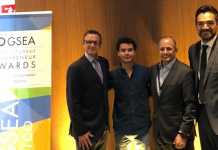A typical computer programmer in San Diego makes around $70,000 to $100,000 a year.
Just 20 minutes south in Tijuana, programmers make much less.
Some startups are recognizing the discrepancy as an opportunity.
“A good coder, you can get one for $800 a month in Tijuana, or about $10,000 annually,” said tech entrepreneur Ramon Toledo. “For a very, very good programmer, you’re looking at about $2,000 a month. So, for a startup, that’s enticing.”
Cheap labor isn’t Tijuana’s only strength in that elusive goal of modern cities: becoming a hub for tech startups. It has an affordable but skilled workforce, proximity to the border and an extremely low cost of living – plus a burgeoning food, wine and craft beer scene.
But the border’s tech startup scene is still stuck in its infancy. That stagnancy bugs Toledo, who says he built a successful business by taking advantage of Tijuana’s mostly untapped opportunities.
He’s the president and founder of Busca Corp, a digital entertainment company with offices in La Jolla, Tijuana and other cities in Latin America.
Busca Corp opened a large office 10 years ago in an upscale Tijuana neighborhood called Colonia Cacho. Toledo said he pays just $600 a month for it, and that the universities in Tijuana are churning out plenty of skilled programmers from which he finds most of his employees.
But he also deals with basic infrastructure problems like water outages, and a mail delivery system that doesn’t function at all.
“The No. 1 problem for startups in other parts of the world is you run out of money too fast,” he said. “In Tijuana, your money lasts longer, so you have more time to make that first sale, or get that second round of financing. That’s where the magic of Tijuana comes in.”
Despite the infrastructure problems, Toledo said, he thinks businesses mostly avoid Tijuana because of perception problems: People still think the city is scary, dangerous and overrun with drug cartels. He wants state and city governments to launch a campaign to brand the city as business friendly.
Tijuana still lacks a major success story. Toledo and others thought 3D Robotics, the buzzed-about drone company launched by former Wired magazine editor Chris Anderson that had a Tijuana office, would be the company that put the city on the map. But the business has since pivoted, and lost its steam.
“So, there aren’t any rock-star startups that Mexican politicians can brag about yet,” Toledo said. “Until that happens, they’re not going to pay any attention.”
It was a big deal when Carlsbad-based Thermo Fisher Scientific opened a headquarters in Tijuana a few years ago, but it didn’t encourage many other entrepreneurs to follow suit. Guillermo Mejía, who works for Mind Hub, a company that offers space and resources to tech startups in Tijuana, said the city’s startup scene will continue to languish until it produces a poster child.
“What we need is an Angry Birds to come out of our binational region,” he said. “We need to get the proof of concept. We’ve had minor successes, but to get those floodgates to open, we don’t need a unicorn to come up from Tijuana, but we do need a small- to medium-sized business to make it.”
Mejía is also part of Frontera Founders, a volunteer group working to connect entrepreneurs on both sides of the border to spark new ventures and build a binational startup ecosystem.
David Peguero, one of the group’s founders, said exciting things are happening in Tijuana, but at a slow pace. GrowthHax, the software company he works for, was founded in Los Angeles, but grew its client base when it hired employees in Tijuana and other parts of Latin America.
Frontera Founders recently pulled together a list of the most common questions entrepreneurs ask about Tijuana. Most are looking for skilled software developers, of which the city has plenty. Others ask about the region’s manufacturing opportunities; huge companies like Panasonic have for decades operated manufacturing plants called maquiladoras in Tijuana, and increasingly a new wave of small startups say they want in.
“We’re seeing more interest in the rapid prototyping, or quickly having something fabricated here,” he said. “So new businesses are popping up, like a 3D printing company that does this kind of rapid prototyping.”
Mike Lenny is a co-founder of ZipDev, a business that helps startups and other small businesses find more affordable software development and technical staffing. ZipDev’s headquartered in San Diego’s Little Italy, but its software developers live in Tijuana and other parts of Mexico. Six of ZipDev’s staffers work in a space just a few feet away from the border wall.
Lenny said his clients are surprised to learn their staff is based in Mexico instead of India, the Philippines or other places known for skilled but affordable workforces.
“A lot of them are surprised that they’re graduating thousands and thousands of software engineers just south of the border,” he said. “But once they find out, they’re open and curious and want to learn more.”
He said working with employees in Tijuana has a lot of benefits. They’re on the same time zone, most are bilingual and their salaries are affordable. He said he expects more entrepreneurs and businesses will catch on to the perks, and eventually the startup scene in Tijuana will grow.
“I would expect that in the coming five to 10 years, we’ll be seeing this particular niche growing a lot,” he said. “It’s not going to be the next India, but something similar that provides even more benefits.”





